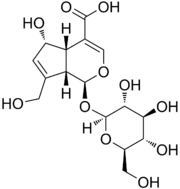- Deacetylasperulosidic acid
-
Deacetylasperulosidic acid  (1S,4aS,5S,7aS)-5-Hydroxy-7-(hydroxymethyl)-1-(((2S,3R,4S,5S,6R)-3,4,5-trihydroxy-6-(hydroxymethyl)tetrahydro-2H-pyran-2-yl)oxy)-1,4a,5,7a-tetrahydrocyclopenta[c]pyran-4-carboxylic acidOther names10-Deacetylasperulosidic acid; 10-Desacetylasperulosidic acid
(1S,4aS,5S,7aS)-5-Hydroxy-7-(hydroxymethyl)-1-(((2S,3R,4S,5S,6R)-3,4,5-trihydroxy-6-(hydroxymethyl)tetrahydro-2H-pyran-2-yl)oxy)-1,4a,5,7a-tetrahydrocyclopenta[c]pyran-4-carboxylic acidOther names10-Deacetylasperulosidic acid; 10-Desacetylasperulosidic acidIdentifiers CAS number 14259-55-3 
PubChem 44153559 Jmol-3D images Image 1 - O=C(O)C1=CO[C@@H](O[C@]2([H])O[C@H](CO)[C@@H](O)[C@H](O)[C@H]2O)[C@@]3([H])[C@]1([H])[C@@H](O)C=C3CO
Properties Molecular formula C16H22O11 Molar mass 390.34 g mol−1  acid (verify) (what is:
acid (verify) (what is:  /
/ ?)
?)
Except where noted otherwise, data are given for materials in their standard state (at 25 °C, 100 kPa)Infobox references Deacetylasperulosidic acid is an iridoid compound found in a few medicinal plants, such as Morinda citrifolia.[1] Some in vitro and in vivo bioactivities of deacetylasperulosidic acid include anti-inflammatory, analgesic, anti-cancer, antioxidant, anti-arthritic, anti-mutagenic, anti-clastogenic, and hepatoprotection.[2][3][4][5][6]
References
- ^ Potterat O, Von Felten R, Dalsgaard PW,Hamburger M (2007). "Identification of TLC markers and quantification by HPLC-MS of various constituents in noni fruit powder and commercial noni-derived products". J. Agric. Food Chem 55 (18): 7489–7494. doi:10.1021/jf071359a. PMID 17696360.
- ^ Akihisa, T; Matsumoto, K; Tokuda, H; Yasukawa, K; Seino, K; Nakamoto, K; Kuninaga, H; Suzuki, T et al. (2007). "Anti-inflammatory and potential cancer chemopreventive constituents of the fruits of Morinda citrifolia (Noni).". Journal of natural products 70 (5): 754–7. doi:10.1021/np068065o. PMID 17480098.
- ^ Liu, G; Bode, A; Ma, WY; Sang, S; Ho, CT; Dong, Z (2001). "Two novel glycosides from the fruits of Morinda citrifolia (noni) inhibit AP-1 transactivation and cell transformation in the mouse epidermal JB6 cell line.". Cancer research 61 (15): 5749–56. PMID 11479211.
- ^ Ling, SK; Tanaka, T; Kouno, I (2003). "Effects of iridoids on lipoxygenase and hyaluronidase activities and their activation by beta-glucosidase in the presence of amino acids.". Biological & pharmaceutical bulletin 26 (3): 352–6. doi:10.1248/bpb.26.352. PMID 12612446.
- ^ Kim DH, Lee HJ, Oh YJ, Kim MJ, Kim SH, Jeong TS, Baek NI (2005). "Iridoid glycosides isolated from Oldenlandia diffusa inhibit LDL-oxidation". Arch Pharmacal Res 28 (10): 1156–1160. doi:10.1007/BF02972979.
- ^ Nakamura, T; Nakazawa, Y; Onizuka, S; Satoh, S; Chiba, A; Sekihashi, K; Miura, A; Yasugahira, N et al. (1997). "Antimutagenicity of Tochu tea (an aqueous extract of Eucommia ulmoides leaves): 1. The clastogen-suppressing effects of Tochu tea in CHO cells and mice". Mutation research 388 (1): 7–20. PMID 9025787.
Categories:- Glycosides
- Iridoid glycosides
Wikimedia Foundation. 2010.
